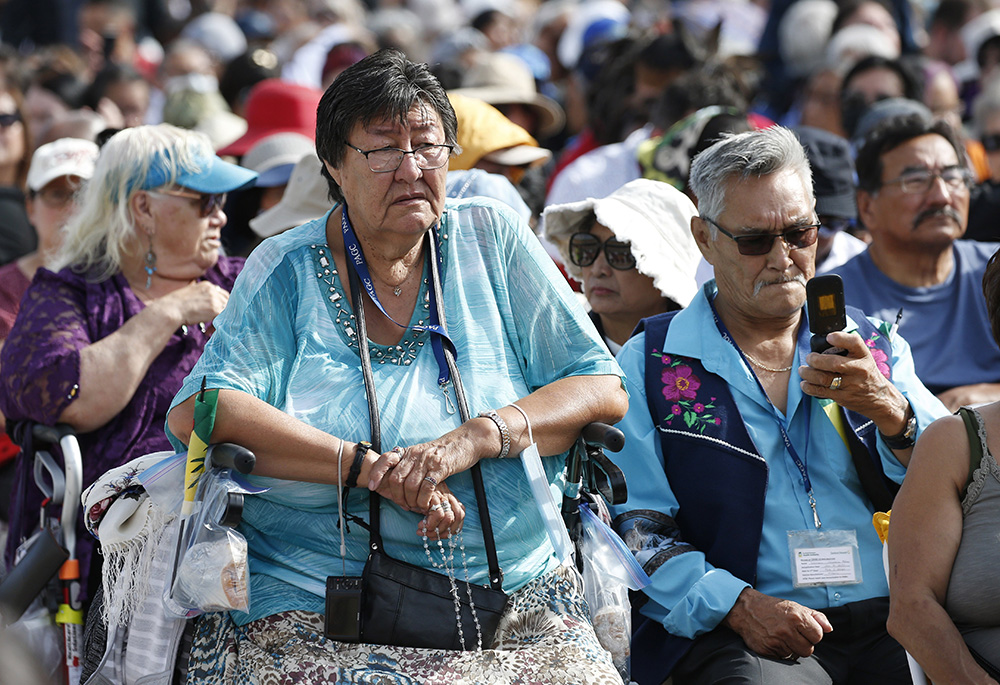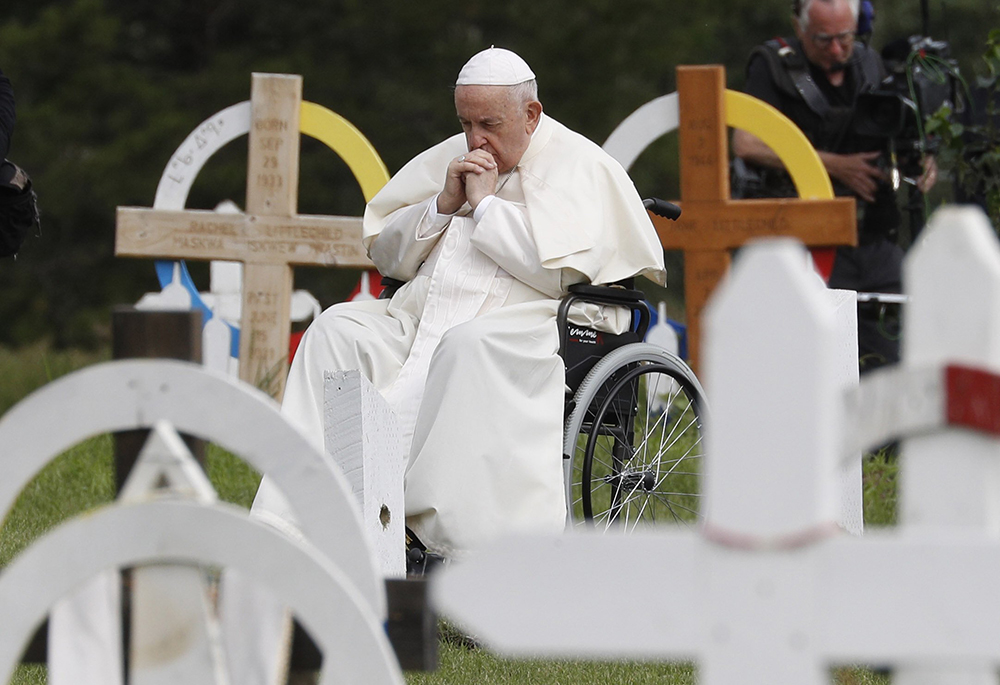
A woman holds a rosary as people wait for the start of Pope Francis' celebration of Mass at Commonwealth Stadium July 26 in Edmonton, Alberta. (CNS/Paul Haring)
I saw the headlines. Following the papal visit to Canada in July, most Catholic news outlets were running stories with headlines like "Pope's Apology Was a Start. Now the Real Work Begins." I sighed with heaviness, because we all know who will be shouldering this task: It will once again fall to survivors and their descendants to continue the work they have been doing for a long time. "Real work" has become the trump card that signals that white work here is done.
As a mixed Native and white Catholic woman in the U.S., I watched Pope Francis' visit to Canada closely. I watched his apology to the First Nations, Inuit and Métis. I watched the various strong reactions many Native people expressed at seeing the pope wear a warbonnet and I watched the Twitter hot takes coming from all sides. I watched it all. My big takeaway? White Catholics still resent that Native people have any claim on the church.
As if reconciliation could ever work when centered on the comfort and norms of whiteness.
White Catholics still resent that Native people have any claim on the church.
During this reactionary time I observed that Native and Indigenous people who continued to insist on their own humanity — and the humanity of the children who died as a result of church-run residential and boarding schools — were ignored or told we were using the wrong words by people seeking to deny the horrors of the residential school system. If we took umbrage with the terminology argument, we were told we weren't being charitable. Or perhaps we didn't love the pope enough. Both assertions miss the very real concerns of Indigenous people regarding this important visit and apology.
I will not link to the worst offenders here; they're easy enough to find online and I have no desire to give them more clicks and attention. But the overarching harmful reactions that predominated coverage of the intersection of Native life and Catholicism was disheartening. I want to expect more of my fellow Catholics. At the very least could their first instinct not be to diminish, dehumanize, contain or distance?
I am Ponca of Oklahoma. I am descended from a grandmother and great-grandparents who all experienced the U.S. Indian boarding school system — specifically Carlisle, Haskell and Ponca. I am also of white descent and am white presenting. I am a cradle Catholic. I grew up a city girl in Dallas, Texas, and now live in Minnesota after spending almost a decade in the San Francisco Bay area.

Pope Francis prays at the Ermineskin Cree Nation Cemetery before meeting with First Nations, Métis and Inuit communities July 25, 2022, at Maskwacis, Alberta. (CNS/Paul Haring)
I say this because specificity matters if we want to have conversations in community. You as a reader need to know where I am coming from, both in terms of my people and my locations. My own personal history is also a history wrapped up in colonization. Such a multilayered history is a truer story than the prevailing desire to tie up a "dark page of history" with a bow. The dark page is not actually a page at all, but a thick and continuing book.
The reality of being Native and Catholic is not as unusual as it may seem. We are a hugely diverse group and represent many hundreds of sovereign Nations. But most of us get the message in various ways that we are not Catholic enough, that our Native-ness is a barrier to true faith in Jesus, that we have to prove our loyalty in ways never asked of white Catholics. In the lead-up to the papal visit, erroneous information calling common Indigenous cultural practices "pagan" popped up in Catholic news, yet the many traditions taken from secular and pagan Roman practices are never questioned for their validity in Catholicism.
Much more concerning than non-Eurocentric cultural practices is the fact that Catholic churches were deeply involved in both the Indian boarding school system and other systems of family and national breakdown among Natives in the United States and Canada. The residential schools in Canada and the boarding schools in the U.S. are intertwined systems with a shared genesis. The Carlisle Indian Industrial School in Carlisle, Pennsylvania, became the model for the Indian schools in the U.S. and inspired the Canadian residential schools. The Catholic Church was deeply involved in both systems, as were other faith traditions.
Catholics of the United States must realize that our church is also implicated, not just the church in Canada. The investigation into the horrors of the U.S. boarding school system has only just begun. Every Native person you meet is somehow connected to that experience. Survivors are still living. We can all hear you say you are tired of hearing about this. Healing is a slow process, but adding to the wounds will do nothing but slow it down and harm the Body of Christ. Healing might be a solo and varying endeavor, but reconciliation is a two-way street.
Advertisement
This papal visit was not a glory trip. It was not meant to make us feel good about Catholicism. I do believe the pope meant it to be an act of contrition and reconciliation. But I mourn that the word "genocide" was not spoken until on the airplane back to Rome. The Doctrine of Discovery still stands in its blood-soaked legitimacy. Thousands of Indigenous items remain in Vatican museums and archives. The desperately needed records of the schools kept in the Vatican and by religious orders remain withheld.
White Catholics cannot opt out of learning about the harms that have been inflicted against the Indigenous community, even and especially if it makes them uncomfortable. Reconciliation concerning something that has occurred over such a long period of time, with still undetermined cost and casualties, requires the involvement of every single one of us.








